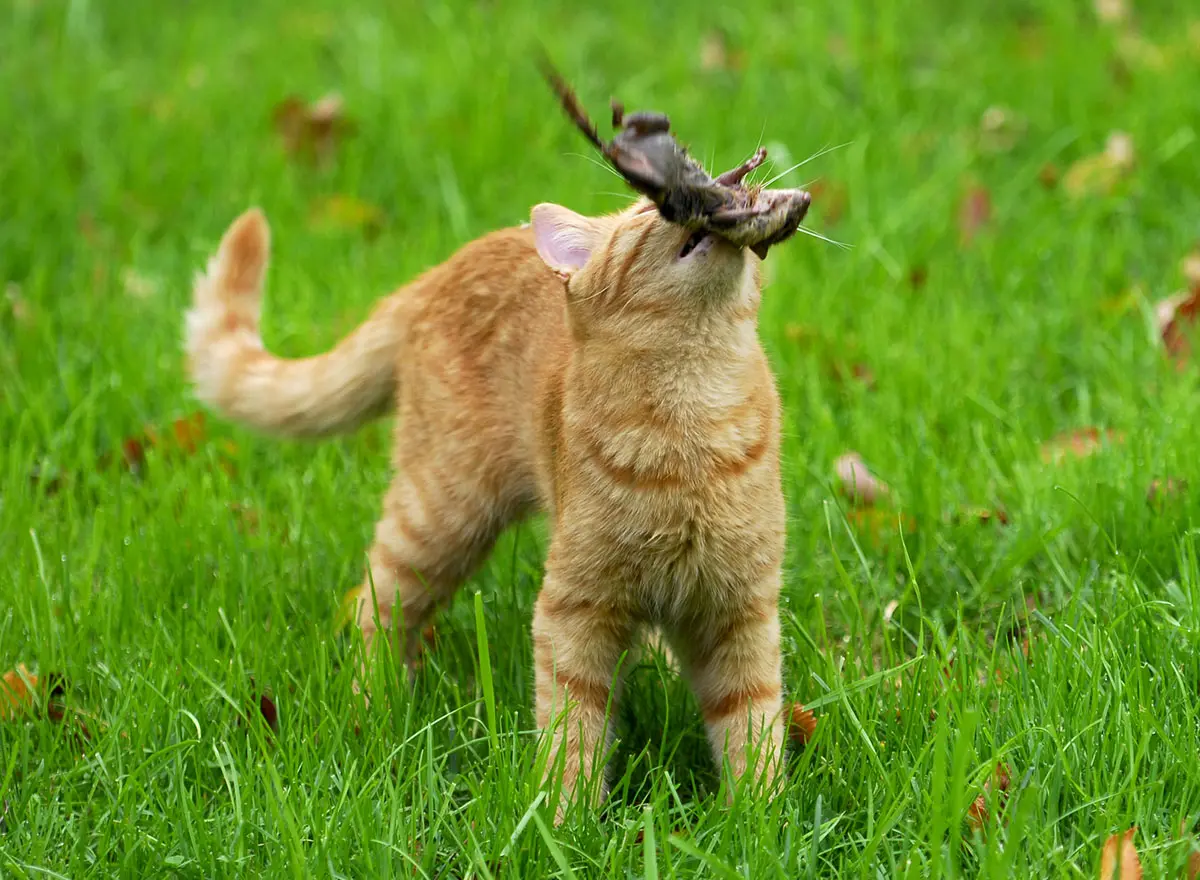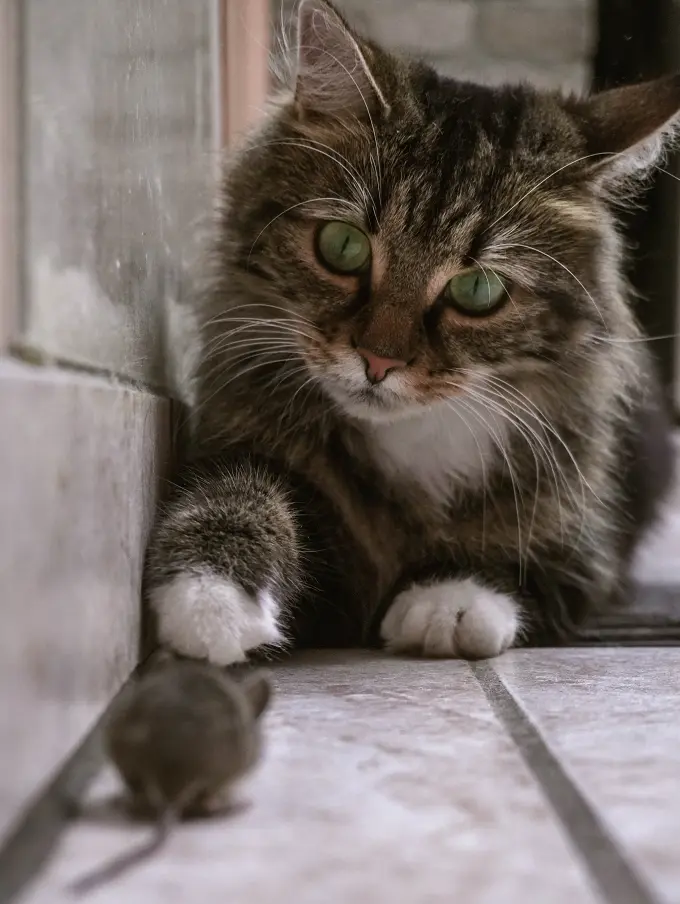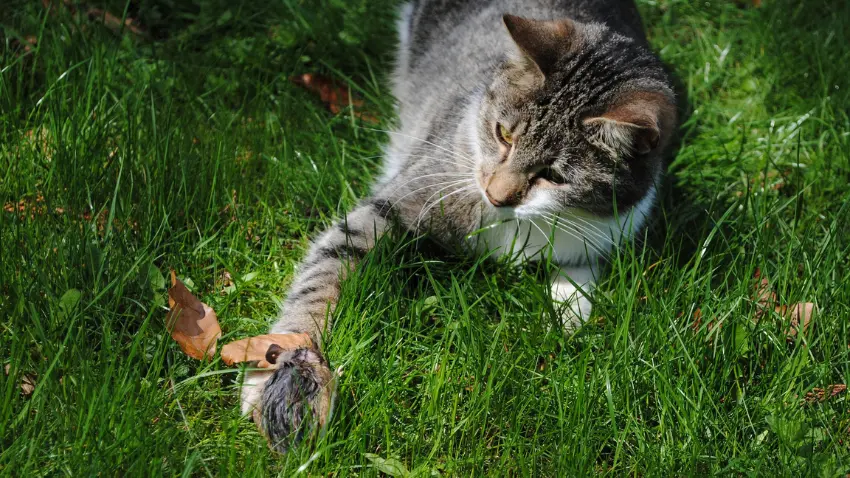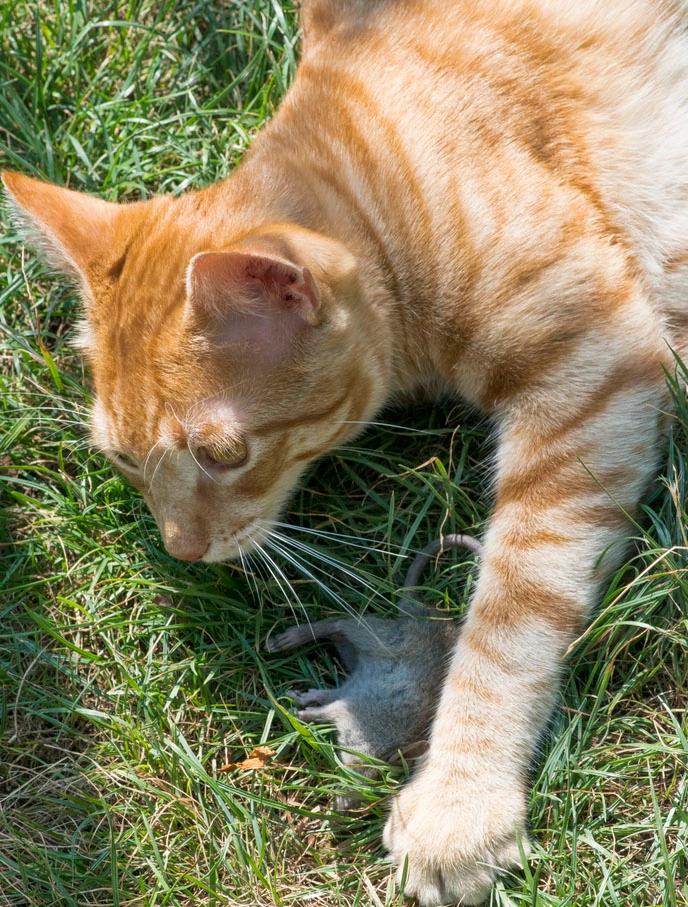Can Declawed Cats Catch Mice? Answered Here!
Felines are known to be great mouse hunters, both in the wild and in a domesticated setting. But the question is, can declawed cats catch mice?
A cat’s claws play a crucial role in its hunting and daily life. This is why it should never be removed unless a strictly medical reason demands it.

In this post, we will discuss declawing, how it affects your cat’s hunting skills, and other information you should know.
Can my declawed cat still catch mice?
A declawed pet can still catch a mouse or two, but it will be far more difficult than when they have their claws intact.
Declawing doesn’t erase a cat’s predatory instincts. Your kitty will still go after mice, birds, and other small creatures that trigger predatory responses.
Although though declawed felines can still hunt, it impacts their efficiency in doing so. Here’s what happens when a declawed cat tries to hunt for mice:

1. It will be difficult to capture prey.
Cats are good at finding their prey, thanks to their 24 whiskers that can sense the subtlest movements.
However, it’s a different story once it’s time to catch their prey. Once a cat pounces, it has to use its claws and teeth to neutralize its target.
While declawed cats can still stun their targets, their lack of claws will sabotage their success rates. They will likely lose their prey, or the kitty may have to pounce it many times before successfully delivering the killing blow.
2. It will be difficult to consume their prey.
Even when your declawed cat successfully captures prey, the next challenge is consuming it. This part requires sharp claws in order to shred the prey into pieces.
Nevertheless, some may prefer to bring their catch to their owners instead of eating them. Please read here: Why Does My Cat Bring Me Things
3. They will be inefficient barn cats.
Lastly, declawed cats can’t be and should never be considered barn cats. This is due to several reasons.
First, declawed cats have a very low success rate when catching mice. They are better off as house pets instead.
Secondly, declawed cats are not safe outdoors. They have reduced ability to fight, climb, or run since they no longer have grippy claws.
In that case, declawed kitties are more susceptible to injuries and fatality when attacked by a feral animal. Whether the cat’s response is fight or flight, both require claws to execute.
Declawing a cat is inhumane!
To set the record straight: declawing is brutal! Removing a cat’s claws is like pulling all the fingernails of a person.
This inhumane and unnecessary procedure is painful to felines. It’s a form of amputation that includes removing the cat’s first joint.
When this is done, the kitty will be forced to stand and run on its toes. It’s similar to a person standing on his knuckles.
Your cat’s claws are part of its body for a reason. It plays an indispensable role in their survival, hunting, and daily life.
Cats are designed to scratch and use their claws. If you don’t like this behavior, you should refrain from getting a feline as a pet in the first place.
There’s simply no reason for a pet owner to declaw their cat. Ultimately, it will cause more trouble and more expensive trips to the vet.
Also, declawed kittens will live a life full of pain and suffering. It will also affect your cat’s ability to walk properly and use the litter box.
Can mice sense a cat in the house?
Cats have a strong sense of hearing and smell, which allows them to sense the presence of mice nearby. Their sensitive whiskers also help them detect changes in the air that may indicate prey.
Even when cats can’t see the mice directly, they can stalk and locate them using their other senses. Felines also have a heightened sense of sight, which allows them to catch mice even in the dark.
Do mice stay away from houses with cats?
Cats can effectively drive away mice when they’re around, but it doesn’t mean the critters will leave your home. They will hide on crannies and crevices that your cat can’t reach.
Also, mice are intelligent creatures. They can easily recognize patterns and scents that may indicate the presence of a feline.
So if you badly need to get a mice infestation eradicated from your home, a cat is not enough. It’s best to call a pest control service to handle the problem.
Which cat will catch mice?
All cats have predatory instincts, but not all are great mousers. Breeds like Siamese Cats, Siberian Cats, Maine Coon, Manx, Persian Cats, and Bengal Cats are some of the skilled mouse hunters you can consider.
On the other hand, cat breeds like Bombay, Cornish Rex, Ragdoll, and Birman aren’t reliable when it comes to hunting. They prefer cuddling and doing their own thing instead of going after mice.
If you’re looking for barn cats, Maine Coons are the best of their kind. You can also consider Japanese Bobtail or any feral cat since they are well-versed in the wild.
Why has my cat stopped catching mice?
It’s normal for some cats to stop going after critters after some time. Old age will weaken their bodies, making them less efficient in this task.
However, if your young mouser suddenly stops catching mice, it might be suffering from a health problem. Consider consulting the vet if your kitty is also exhibiting weakness, poor appetite, vocalization, or aggression.
At what age do cats start killing mice?

Cats have an inborn nature to hunt, but this doesn’t kick in until the kitty turns seven weeks old. This is the usual timeline among kittens that are kept under their mothers’ care.
It’s because cats learn hunting from their mothers at a young age. So if your pet has been separated from its litter too early, it may fail to catch and kill any critter.
If you want your kittens to be excellent barn cats or mousers, make sure that they stay with their mothers for as long as possible. This way, their hunting skills will be developed properly.
Can cats smell mice through walls?
Felines have the so-called Flehmen response, where they use their tongue to grab molecules from the air. These molecules are pushed into the cats Jacobson’s organ, which allows kitties to potently smell something in the air.
This means that even rats behind walls are not spared from a cat’s keen sense of smell. With this, you may notice your cat scratching or fixating on a spot on the wall for no reason.
What should I do if my cat catches a mouse?

Don’t panic if your cat catches a mouse and brings it to you. It’s actually a good sign, which means that your cat sees you as part of its family.
Still, it’s important to get the prey before your kitty eats it. Mice are reeking with parasites, germs, and viruses that can wreak havoc on your pet’s health.
After you dispose of the dead mice, the Centers for Disease Control and Prevention recommends a solution of 1.5 cups of bleach on a gallon of water. Use this solution to clean the areas where your cat brought the mice.
If your pet brought its prey on your bed, make sure that you change your sheets and treat it with the same bleach solution if possible. You can also use other detergent alternatives if bleach will affect the fabric’s colorfastness.
Are female cats better mousers?
According to Cat Fancier’s Association Allbreed judge Hope Gonano, female cats tend to be better mousers in most cases.
As a cat owner for many years, I can attest to this statement. Our female cats have brought us more ‘gifts’ than any of our male kitties have ever done.
Nevertheless, both cat genders can hunt equally well. But in terms of instincts, females tend to be more of a killer since they need to protect their litter from predators.
Conclusion
Can declawed cats catch mice? Yes, but it will be more difficult since they don’t have their sharp claws to deliver the killing blow.
Also, whatever happens, never get your cat declawed. The only exception is when the vet recommends doing so due to a medical situation.
But other than that, your pet cat needs its claws intact. This will let them catch mice and other critters around your property.
Leaving your cat’s paws and claws alone will also save you from a lot of trouble.
